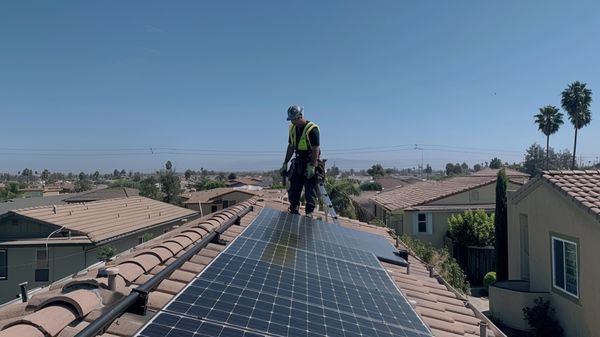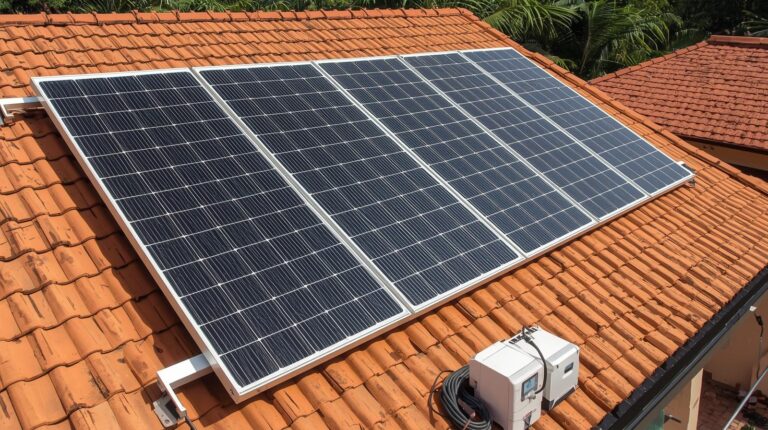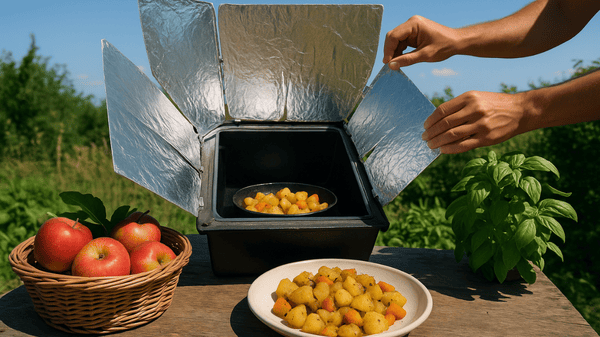You can indeed install your own solar panels, but it requires essential skills, tools, and safety measures. Benefits include cost savings and energy independence, but challenges like safety risks and complex regulations exist.
To navigate this project successfully, you need technical expertise, safety knowledge, and basic carpentry skills while owning tools like a power drill and ladder. Prioritize safety gear, adhere to local regulations, and plan maintenance for peak performance. Be mindful of safety precautions, local laws, and maintenance routines to guarantee a successful installation.
Key Takeaways
- DIY solar panel installation is feasible with proper skills.
- Consider safety risks and regulations before proceeding.
- Assess site location and acquire necessary permits.
- Ensure knowledge of electrical systems and tools required.
- Monitor and maintain panels for optimal performance.
Pros of DIY Solar Panel Installation
When considering the pros of DIY solar panel installation, one of the primary advantages is the cost-saving potential. By taking on the installation yourself, you can considerably reduce the financial burden associated with hiring professionals. This financial savings can be substantial and can help you achieve energy independence without breaking the bank.
Additionally, DIY solar panel installation offers environmental benefits. By harnessing the power of the sun to generate electricity, you’re reducing your reliance on fossil fuels, which helps lower carbon emissions and minimizes your carbon footprint.
Embracing the DIY route empowers you to take control of your energy needs while making a positive impact on the environment. DIY installation also allows for a deeper understanding of battery evaluation for long-term off-grid capabilities.
Cons of DIY Solar Panel Installation
When considering the cons of DIY solar panel installation, safety risks should be a primary concern. Without the necessary expertise, you may inadvertently expose yourself to electrical hazards or other dangers.
It’s essential to prioritize safety and consider seeking professional assistance to mitigate these risks. Additionally, proper site location assessment is crucial for optimal performance and longevity of off-grid solar systems.
Safety Risks Involved
Considering the safety risks involved in DIY solar panel installation is essential before initiating such a project.
When attempting to install solar panels on your own, you expose yourself to potential electrical hazards and risks to structural integrity. Here are some safety concerns to keep in mind before proceeding:
- Electrical hazards: Working with solar panels involves dealing with electrical components, which can be dangerous if not handled correctly. The risk of electric shocks or fires is significant when installing solar panels without proper expertise.
- Structural integrity: Mounting solar panels on rooftops or other structures requires a good understanding of load-bearing capacities and installation techniques. Incorrect installation can lead to panels falling or causing damage to the property.
To guarantee your safety and the effectiveness of your solar panel system, it’s advisable to consult with professionals who’ve the expertise to handle these risks effectively.
Prioritizing safety in solar panel installation is vital for a successful and secure setup.
Lack of Expertise
Curious about the potential drawbacks of starting a DIY solar panel installation project? When it comes to installing solar panels on your own, one significant challenge to take into account is the lack of expertise. Here’s why:
- Installation Challenges: Without prior experience, maneuvering through the complexities of solar panel installation can be intimidating. From understanding electrical wiring to mounting the panels correctly, there are numerous technical aspects that require a certain level of expertise.
- Learning Curve: Mastering the intricacies of solar panel installation takes time and dedication. The learning curve can be steep, especially for those unfamiliar with the technical aspects of solar energy systems.
Embarking on a DIY solar panel installation journey without the necessary expertise may lead to costly mistakes and safety hazards.
While the idea of self-sufficiency is empowering, it’s crucial to recognize the value of professional expertise in ensuring a successful and efficient solar panel installation process.
Necessary Skills for Installation
When it comes to installing solar panels, having the necessary skills is vital. Required technical expertise, including knowledge of electrical systems and solar panel configurations, is essential for a successful installation.
Understanding safety considerations involved in working with electricity and heights is paramount to guarantee a safe working environment. Additionally, familiarity with solar panel efficiency factors can help optimize the system’s performance.
Required Technical Expertise
To successfully install solar panels, you need a specific set of technical skills. Understanding installation regulations is vital to guarantee compliance with local laws and safety standards.
System compatibility is another key aspect that requires technical expertise to confirm that the solar panels work efficiently and effectively.
Here are the necessary technical skills for installing solar panels:
- Knowledge of electrical systems: Understanding how electricity works and being able to safely handle electrical components is essential.
- Roof assessment skills: Being able to assess the structural integrity of a roof and determine the best placement for solar panels.
- Basic carpentry skills: Ability to work with tools and construct frames or mounts for the solar panels.
- Wiring expertise: Connecting the solar panels to the electrical system of the building in a safe and efficient manner.
Having these technical skills will empower you to successfully install solar panels on your own.
Safety Considerations Involved
Evaluating and addressing safety considerations is paramount when installing solar panels. Before initiating the installation process, it is vital to be aware of local regulations regarding solar panel installations.
Familiarize yourself with the specific requirements in your area to guarantee compliance and avoid any legal issues. Additionally, understanding the insurance implications of installing solar panels is essential.
Some insurance companies may require specific safety measures to be in place, so it’s important to check with your provider beforehand. To help you navigate the safety considerations involved in installing solar panels, here is a table outlining some key points to keep in mind:
| Safety Considerations | Description |
|---|---|
| Local Regulations | Research and adhere to the regulations governing solar panel installations. |
| Insurance Implications | Understand the impact of installing solar panels on your insurance policy. |
Essential Tools for Installation
You’ll need a set of essential tools to successfully install solar panels on your property. Having the right installation equipment and solar panel materials is vital for a smooth and efficient setup.
Here are the key tools you’ll need:
- Power drill: Essential for securing panels to the mounting structure.
- Ladder: To access the roof safely and work at different heights.
- Socket set: For tightening bolts and nuts during installation.
- Wire cutters/strippers: To handle electrical wiring safely and effectively.
- Stud finder: Helps locate studs in the walls or roof for secure mounting.
- Level: Guarantees panels are installed straight and correctly aligned.
- Safety gear: Includes gloves, goggles, and a hard hat for protection.
Safety Precautions to Consider
Having the right tools for installing solar panels is imperative, but guaranteeing safety throughout the installation process is equally important.
When initiating the installation of solar panels, it’s essential to prioritize personal protective equipment to safeguard against potential hazards. Here are some safety precautions to take into account:
- Personal Protective Gear: Equip yourself with safety glasses, gloves, and a hard hat to protect against any debris or falls.
- Electrical Hazards: Always assume that solar panels are live and handle them accordingly. Turn off the electricity before working on any electrical components.
- Proper Training: Confirm you have the necessary knowledge and skills to handle electrical components safely.
- Secure Ladder Usage: Use a sturdy, stable ladder when working at heights to prevent falls.
- Weather Considerations: Avoid installing solar panels during inclement weather to minimize the risk of accidents.
Ensure to follow safety guidelines provided by experts when handling solar panels to prevent accidents and ensure a secure installation process.
Tips for Successful Installation
For a successful installation of solar panels, preparation is key. Before you begin, make certain to obtain all necessary installation permits from your local authorities. Familiarize yourself with the local regulations regarding solar panel installations to guarantee compliance and prevent any issues down the line.
Here are some tips to help you successfully install your own solar panels:
- Plan the layout of your solar panels carefully to maximize sunlight exposure.
- Invest in high-quality solar panels and equipment for better performance and longevity.
- Verify your roof is structurally sound and can support the weight of the solar panels.
- Follow proper safety protocols during the installation process to prevent accidents.
- Consider hiring a professional for complex electrical work or if you’re unsure about any step.
- Regularly monitor and maintain your solar panels to guarantee peak efficiency and performance.
When engaging in the installation process, ensure to follow all necessary safety protocols to protect yourself and prevent accidents during the setup.
Conclusion
To sum up, while installing your own solar panels can be a cost-effective and rewarding DIY project, it is important to carefully consider the necessary skills, tools, and safety precautions involved.
One example of successful DIY solar panel installation is the case of John, who saved thousands of dollars by installing his own panels and now enjoys the benefits of renewable energy in his home. With proper research and preparation, anyone can successfully install their own solar panels.







